Question #516ce
1 Answer
Nov 26, 2017
Can be either...
Explanation:
Prokaryotes: : for instance bacteria
These are unicellular organisms...
Eukaryotes:: You can't help thinking immediately about Humans, other mammals and/or other higher organisms, but they are multicellular of course.
But there are unicellular, eukaryotic organisms: Baker's yeast (Saccharomyces Cerevisiae), Amoebae, etc.
Lastly: it could be a human cell as well: e.g. the famous HeLa strain of (cancerous) cells, more or less the standard vehicle for research in Eukaryotes (e.g. cancer research).
Whether the last example constitutes an organism is debatable though...
Cerevisiae:

HeLa Cells:

